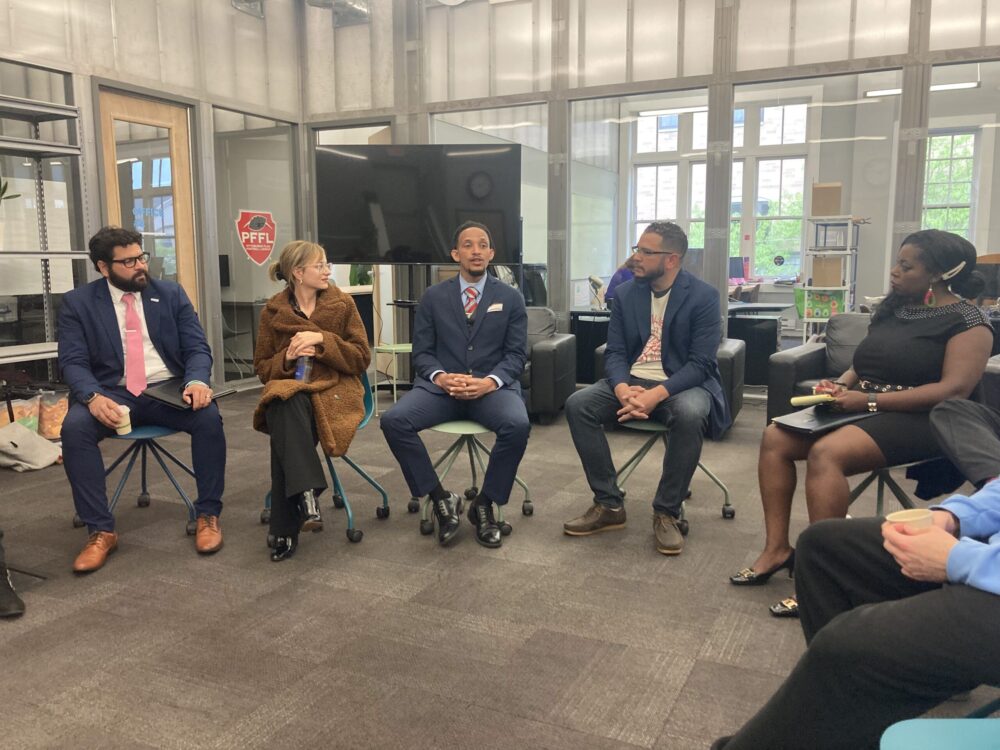Apprenticeships are often considered to be a win-win of workplace development: Trainees get hands-on skills development, usually paid, and employers get talent ready to plug in where those skills are needed. And in the 2020s, they’re also leaving beyond the stereotype that they’re only for the building trades, as technology companies use apprenticeships to prep the next generation of employees.
Yet as the workplace is increasingly shaped by AI and robotics — but in need of technologists who understand them — workforce development organizations like Partner4Work are seeking advice from people who actually work in tech on how to make apprenticeships more accessible.
With that in mind, the org asked WITPgh founder Alison Falk, Fortyx80 Assistant Director of Talent Development Terrell Irwin, and Gizmology Program Director Kirk Holbrook to explain their own journeys into tech, while providing insight on how to widen the path for others.
Now that he’s designed an apprenticeship program himself at Deeplocal — the Sharpsburg-based company’s Gizmology launched this spring — Holbrook said he felt it was important to understand that almost anyone, from a high school graduate to a single mother in her 30s, has the capability to work in the industry.
“I think if I can open that door, then hopefully there will be that trust there and we could effectively address the issues as they emerge.”Kirk Holbrook Gizmology
Thus, he doesn’t need applicants to have an extensive background in product management. Instead, the focus is on their creativity and ability to learn. What matters, Holbrook said, is addressing the systemic issues that make people with an interest in the field feel it’s closed off to them. Because the one-year Gizmology program is geared toward Pittsburgh’s Black and marginalized community, that includes a willingness to fill in the gaps that could arise for program members as they go through the program — offering bus passes to training in Hazelwood, for instance.
“I think my approach was kind of openness, and [offering] 100% support for whatever issues may come up,” Holbrook said during an XchangeInnovation Week panel on equitable apprenticeships and internships. “I think if I can open that door, then hopefully there will be that trust there and we could effectively address the issues as they emerge.”
Falk brought the perspective of having had little STEM exposure growing up in a rural area, and later facing obstacles related to being her father’s caretaker and lacking consistent transportation when she was completing a coding bootcamp. She stressed that it’s important to help apprentices understand the different opportunities available to them, recalling that in the beginning of her career, she thought her only job prospects were in programming. A peer noticed her unhappiness with her role and helped her pivot.
“I’ve had to have somebody come to me and be like, ‘I know you’re struggling here doing this job need to get out of here’ and ‘Why don’t you try this stuff?’” Falk said. Her managers hadn’t taken the time to introduce her to different tasks and skills: “They just wanted me to keep going like a machine and I was just unhappy.”
When Fortyx80 gives hiring companies candidate profiles, they eliminate race and gender in favor of only listing the person’s skills.
Irwin explained that Fortyx80’s approach starts with equity, meaning its programs try to fill in some of the gaps left by society or their candidate’s own lives. Sometimes this has meant paying for an Uber for an apprentice who lived an hour away from where the program took place, or a new approach to building resumes.
At Fortyx80, Pittsburgh Tech Council’s nonprofit arm that runs the Apprenti PGH program, when they give companies candidate profiles, they eliminate race and gender in favor of only listing the person’s skills. Since the organization works with so many women, veterans and racial minorities Irwin said, they feel this is the best way to convince hiring companies to see the whole picture of the person, sans biases.
“We really use that approach to catapult the people into those positions and to just let them know that your creativity may be one of the things that [enables you] to do some of these techniques and roles,” he said.
Ultimately, all the panelists agreed that a human-centered approach combined with a commitment to equity is the best way to make apprenticeship programs more successful and inclusive. Holbrook said a good way to start would be investing in STEM education before most students would be old enough to apply to be apprentices.
“There has to be some level of early exposure to some of these skills,” he said. “If we can get into a high school or middle school, or an after-school program to teach young people how to really make a difference, then they [can] begin to actually see themselves somewhere else. That’s what I think is going to address some of these gaps.”







